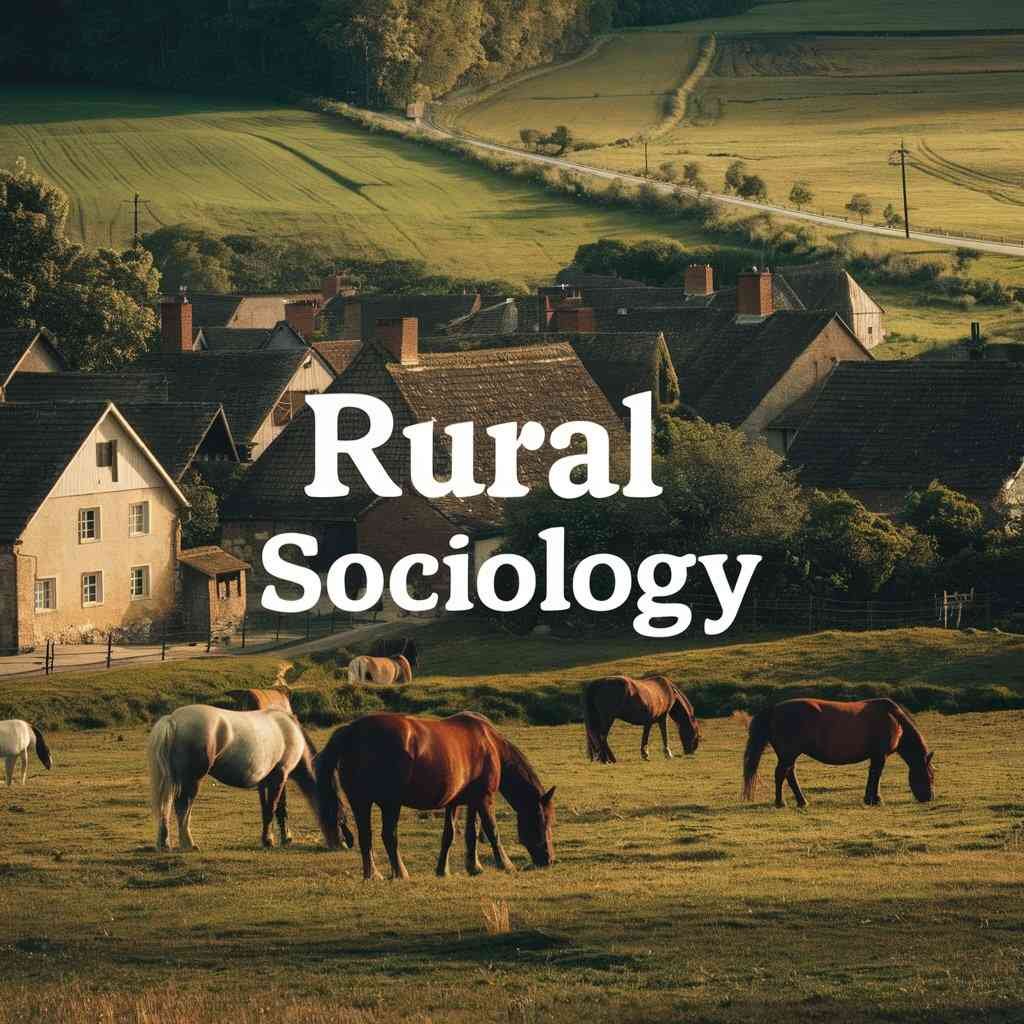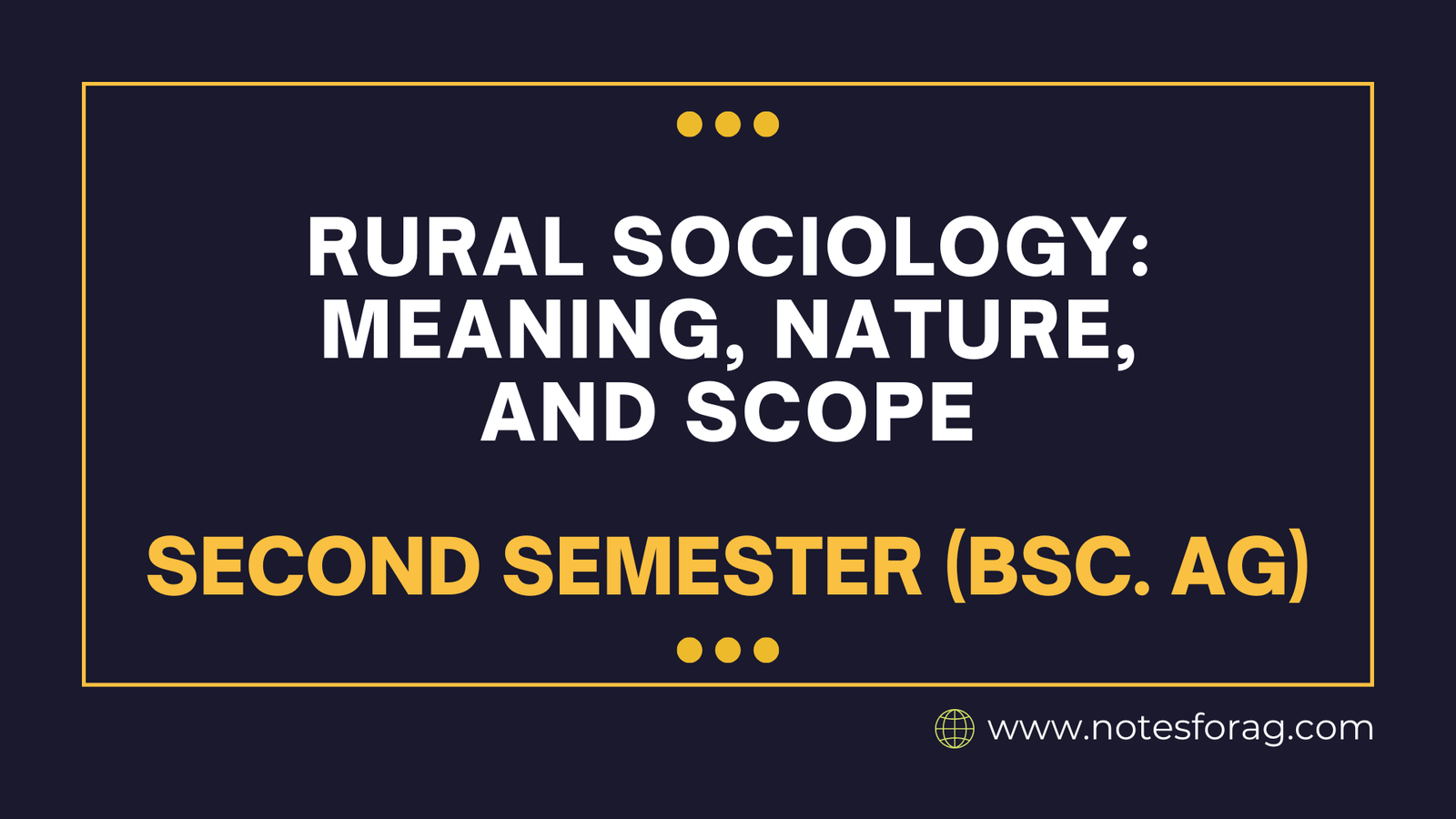Social structures, interactions, and processes in rural areas are the subject of scientific study in rural sociology. In particular, it looks at the social ties that define rural communities and their development, agricultural practices, rural economies, and community dynamics. Aspects such as migration patterns, links between rural and urban areas, and the effects of globalization and modernization on rural societies are all included in the field of rural sociology. By addressing and comprehending the issues that rural residents face, it hopes to support the growth of just and sustainable rural communities.
Table of Contents
Introduction to Rural Sociology

Specializing in the study of social dynamics, structures, and changes in rural communities, rural sociology is a branch of sociology. It explores the distinctive qualities and difficulties that characterize rural life, providing insightful information about how these communities operate and change over time. The value of rural sociology is found in its capacity to illuminate the complex social structures of rural communities, which are frequently ignored by research that focuses exclusively on cities.
The origins of rural sociology can be found in the early 1900s, when sociologists started to identify the particular social issues and patterns that were common in rural areas. During this time, a methodical investigation of rural life began, which eventually resulted in the development of rural sociology as a separate academic field. In order to comprehend the intricacies of rural societies, the field has developed over time, incorporating a variety of theoretical frameworks and methodological approaches.
Nature of Rural Sociology
Within the larger discipline of sociology, rural sociology is a separate field that focuses on the study of rural communities, their social structures, and the institutions that influence their way of life. It aims to comprehend the distinctive social dynamics that set rural areas apart from urban ones, which are frequently characterized by lower population densities, agricultural economies, and tighter-knit social relationships. Through an analysis of these communities, rural sociology seeks to clarify the different facets of rural life, such as social norms, economic activities, and cultural practices.
The nature of rural sociology is characterized by its focus on:
- Community and Social Relationships: It highlights how tight-knit rural communities are and how social relationships are frequently vital to the social fabric.
- Agricultural and Economic Activities: The study of rural sociology focuses on the economic activities that support rural populations as well as rural industries and agricultural practices.
- Cultural Traditions: This section examines how rural and urban cultures differ in terms of the customs, values, and norms that are common there.
- Rural-Urban Interactions: It looks into how rural and urban areas interact, as well as how migration and resource flows occur there as well as how urbanization affects rural life.
- Social Change and Development: This section examines how social change and development occur in rural areas, taking into account the effects of globalization, policy changes, and technology improvements.
Scope of Rural Sociology
The field of rural sociology investigates a wide range of topics, including the complex relationships that exist among rural populations. Examining agricultural practices—including modern and traditional farming methods, technological developments, and the socioeconomic effects on rural livelihoods—is one area of primary concentration. This field of study includes researching how agriculture functions in rural economies and how it interacts with the world’s food systems.
The scope of rural sociology is broad and includes the following areas:
- Rural Social Institutions: This section looks at the roles and responsibilities of rural context-specific institutions like the family, local government, education, and religion.
- Agrarian Studies: Examining farming methods, land use trends, rural labor markets, and farmers’ socioeconomic standing.
- Rural Development: Examining methods for developing infrastructure, reducing poverty, and promoting sustainable agriculture in rural areas.
- Population Studies: Examining migration patterns, population density, birth and death rates, and other demographic trends in rural areas.
- Environmental Issues: Researching problems with resource management, conservation, and environmental sustainability as well as the interactions between rural communities and their natural surroundings.
- Health and Education: Evaluating the impact of healthcare and education on rural life, as well as the accessibility and caliber of these services in rural areas.
Future Trends and Challenges
Present-day issues and new trends are influencing the direction of rural sociology, which puts it at a critical crossroads. How globalization and technology are affecting rural communities is one of the biggest trends of the future. Revolutionizing rural economies, social structures, and lifestyles are the introduction of sophisticated communication technologies and global economic integration. In rural areas, for example, greater internet connectivity has made it possible for people to access markets, education, and information like never before, but it also brings with it new difficulties like the digital divide and cultural heterogeneity.
The contribution of rural sociology to the study of climate change is another important field of study. Rural communities are frequently at the forefront of environmental issues, directly affecting biodiversity, agriculture, and water resources. The study of the relationship between environmental sustainability and rural livelihoods is a specialization of rural sociologists, who can provide important insights into adaptive tactics and legislative interventions that can lessen the negative effects of climate change.
There are significant obstacles associated with these opportunities, though. Research scope and depth are frequently limited by funding constraints, which continue to be a persistent obstacle. More often than not, progress can also be hampered by political and social resistance, especially in areas where sociological studies are viewed with suspicion or where policy recommendations run counter to powerful interests. Innovative study techniques that can adequately convey the nuances of rural life in a world that is changing quickly are also desperately needed.
Future interdisciplinary collaboration in rural sociology is expected to bring together insights from public policy, environmental science, and economics. Subtopics like social equity, community resilience, and sustainable development are ideal for more study. Through tackling these new developments and resolving the related obstacles, rural sociology can keep advancing our knowledge of and ability to improve rural communities around the world.
Frequently Asked Question(FAQ)
What is rural sociology?
Rural sociology is the study of rural communities’ social structures, social dynamics, and way of life. Understanding the distinctive features of rural communities—their institutions, cultures, and economies—is the main goal of this approach.
Why is rural sociology important?
The value of rural sociology lies in its ability to shed light on the opportunities and problems that rural communities face. It provides insight for decisions and actions meant to promote sustainable development and raise rural residents’ standards of living.
Related Articles

